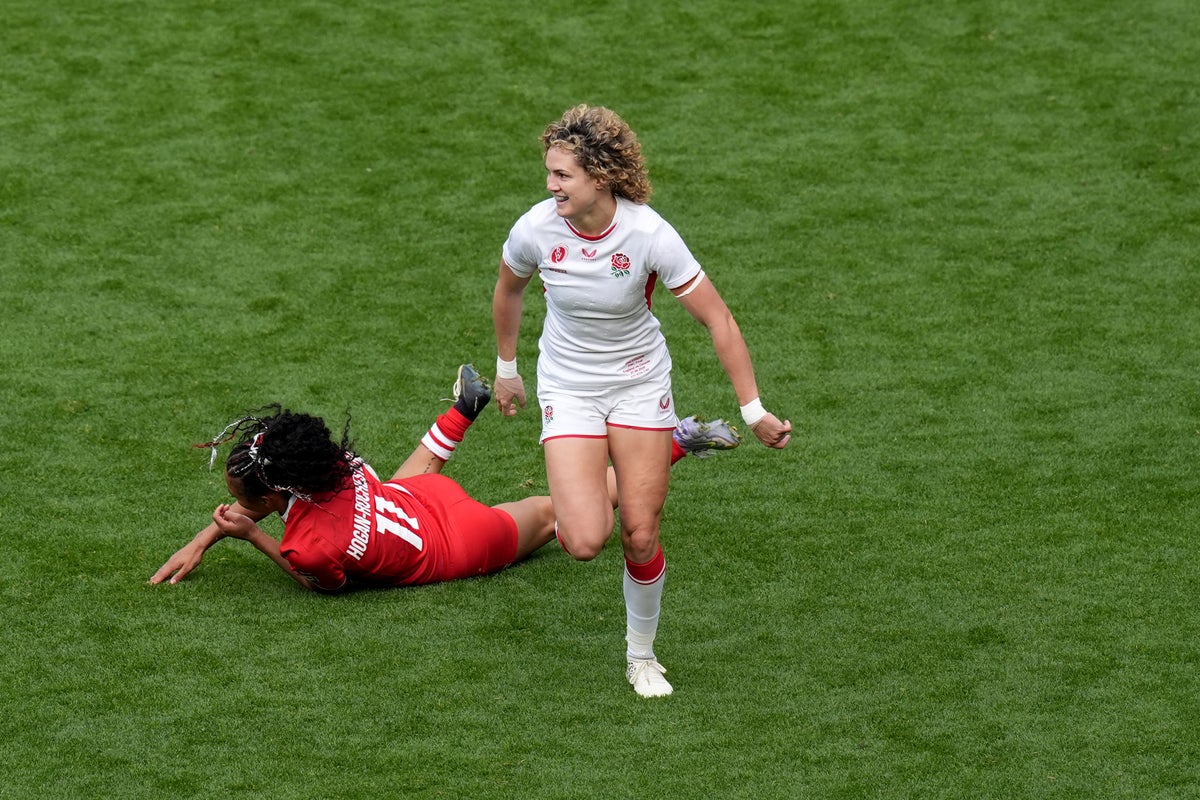There has been plenty of gloom for England to endure even as they have sent women’s rugby up into the stratosphere but, at last, the sun shines on a Red Roses side in full bloom. The most successful international side in Test history now have the ultimate prize to crown their dominance, 32 matches unbeaten turned into a 33rd that mattered more than the rest put together. With a command, control and quality befitting champions, the hosts banished the ghosts of two final defeats to triumph again in front of a record crowd.
Seldom did it feel like there was to be more World Cup woe for John Mitchell’s history makers. Not here, not now, not on this, of all days. From the moment that Zoe Aldcroft had marched through the Rose and Crown Gates and into Allianz Stadium past the Twickenham thousands, England had a focus and authority of a team awaiting coronation.. Could they handle the weight of expectation? Could they ever – Canada, so excellent throughout this World Cup, were comprehensively outplayed by an England side peaking at the right time. Mitchell had vowed to take this team from good to great; on the biggest stage in the sport’s history, they delivered.
What a day this was for those Red Roses, from the magical Ellie Kildunne through to peerless prop Hannah Botterman, and many more besides. What a day, too, for women’s rugby, sold-out stands and a festival feel providing just the sort of occasion that could catalyse the sport. If this proved one game too far for the runners-up, how wonderful it has been to see Canada blossom at this tournament; let us hope they, and others, continue to invest to provide more compelling competition.
Among the 81,885 fans that filled the three Twickenham tiers to the rafters were so many who had given so much to ensure that this day was reached, from the community coaches that set the players on their way to the executives who dared to dream and fought battles in the boardroom to provide this sort of stage. Here, too, who have been plenty of heroes of the future, the Red Roses that will one day grow in the fertile turf that has now been ploughed.
It was only six years ago that England had been watched by a small smattering at an emptying Twickenham as the second part of a dispiriting double-header; one could not help but be moved by the scale of the progress made. They arrived in their droves even with the morning dew still dripping from the trees that line Whitton Road as it makes its course down from the station, 50,000 or more already through the gates for a hotly-contested third-place play-off won most impressively by New Zealand. It was the sort of atmosphere that could stimulate or suffocate.
Initially, it looked to be the Canadians in the former camp. Out of the blocks they shot with a try inside five minutes, Asia Hogan-Rochester wheeling away down the left after England’s lineout had misfired close to their own line. A stunned silence befell Twickenham – but not for long.
The name of Kildunne had drawn a raucous reception ahead of kick off and her many disciples soon had reason to roar in earnest. There appeared little on as the full-back stepped up into first receiver and yet, as is her wont, Kildunne found space anyway, a whirl and a waltz past three defenders sending her dancing under the posts. Cue doffed cowboy hats and mimed lassos for England’s beaming north star.
In the week, Canada had described a highly-structured England as a straightforward team to play against, but a mightily tricky one to beat, and so it proved. Perhaps even more than usual, the Red Roses played to their strengths, adding a contestable kicking game to their set-piece might to win territory while packing their forward bruisers around the fringes to prevent Canada gaining momentum.
Amy Cokayne – a hat-trick scorer in the last final – tucked in with familiar fashioning at the maul, before a thunderous scrum shove from Hannah Botterman and Maud Muir set up Alex Matthews to interchange neatly with fellow 2014 World Cup winner Natasha Hunt at its rear. Another thing of set-piece beauty looked to have arrived before half time, only for television match official Leo Colgan to spy some obstruction before the lineout drive had been fully formed.
A Sophie de Goede penalty gave an outclassed Canada something to take down the tunnel. There would have been no panic in the dressing room but their accuracy so far had stood in stark contrast to their first 40 against New Zealand in the semi-final; without the same go-forward in close combat, their attempts to go wide were often overly hasty and hurried.
England picked up where they left off as Abbie Ward crunched over, but then came a possible turning point to tilt the contest. As it was, it was tilting that was the problem: Botterman, a tone-setter around the corner throughout, sent to the sin bin for a tip tackle on Karen Paquin. Canada soon capitalised, numbers on the left allowing Hogan-Rochester to run in her second.
This was not, however, their day. Another chance came and went in a clatter of hands, and England reasserted themselves through the strength of their scrum. Matthews, an understated hero of the last decade, scored a deserved second and then a party that had rumbled since the early morning knockings could really begin.

